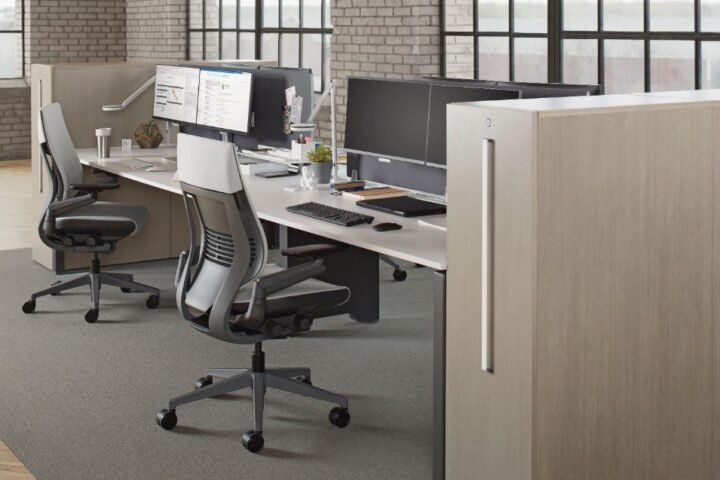In today’s dynamic work environment, the office table design plays a pivotal role in shaping productivity, comfort, and overall aesthetics. The office table is more than just a piece of furniture; it serves as the foundation for everyday work activities, collaboration, and creative thinking. Choosing the right office table can influence employee morale and efficiency significantly. A well-designed office table supports ergonomic principles, accommodates technology needs, and complements the office’s visual appeal, making it a crucial element in workspace planning.
The evolution of office table design reflects changing work patterns and technological advancements. From traditional bulky desks to sleek, modular, and multifunctional tables, the design spectrum is vast. Modern offices increasingly prefer tables that provide flexibility, ease of movement, and better cable management to keep workspaces tidy. Moreover, with the rise of remote and hybrid work, office tables must cater to diverse working styles, whether for individual focus or team collaboration. Selecting the right office table design means balancing functionality, comfort, and style to create a space where employees can thrive.
Ergonomics and Functionality: Core Considerations for Office Table Design
One of the most critical aspects of any office table design is ergonomics. An office table that is poorly designed or not adjustable can lead to discomfort, fatigue, and even long-term health issues for employees. Ergonomically designed office tables encourage proper posture, reducing strain on the back, neck, and wrists. This focus on health and well-being helps boost productivity as employees can work longer with fewer physical complaints.
Functionality is equally essential. An ideal office table should have enough surface area for essential work tools, such as computers, documents, and office supplies, without feeling cluttered. Storage options like drawers or built-in shelves enhance organization and help keep the workspace clean. Additionally, modern office tables often integrate cable management systems to accommodate the growing number of electronic devices, preventing tangled wires and improving safety.
Adjustable office tables have become popular, especially those with height-adjustable features allowing users to switch between sitting and standing positions. This adaptability not only promotes better health but also aligns with the flexible nature of modern work environments. When choosing an office table, the focus should always be on creating a space that supports comfort, efficiency, and ease of use.
Style and Aesthetics: Enhancing Office Ambiance Through Office Table Design
The visual appeal of an office significantly impacts the mood and motivation of its occupants. The design of the office table contributes heavily to the overall aesthetics of the workspace. Whether the office follows a minimalist, industrial, traditional, or contemporary theme, the office table should complement the design language to create a cohesive and inviting environment.
Materials play a major role in the style of office tables. Wooden tables bring warmth and a classic feel, while metal and glass options lend a modern and sleek look. Finishes like matte, glossy, or textured surfaces also influence the table’s appearance and the office’s ambiance. Color choices are critical, too, as lighter tones can open up small spaces, whereas darker tones add sophistication and gravitas.
The shape of the office table also matters. Rectangular tables are common and practical, but round or oval shapes promote collaboration by allowing better eye contact and communication among team members. Modular and customizable office tables enable companies to design layouts that reflect their brand identity and foster creativity.
Space Optimization with Smart Office Table Solutions
In many offices, space is at a premium, making the right office table design vital for maximizing usable area. Smart office tables are designed to optimize space without sacrificing comfort or utility. Compact desks with foldable or extendable surfaces allow employees to adjust their workspace according to the task or available room.
Corner desks and L-shaped tables are popular choices for optimizing corner spaces and providing ample surface area without occupying excessive floor space. These designs often include built-in storage solutions to further save space and enhance organization. Additionally, desks with integrated charging ports and wireless charging pads cater to modern technology needs, reducing clutter from cables and adapters.
For co-working spaces and open offices, modular office tables that can be rearranged and combined offer flexibility. These designs support different working modes, from solo work to group meetings. Space-saving designs that double as storage or incorporate hidden compartments contribute to a neat, efficient office environment.
The Role of Technology Integration in Office Table Design
As technology becomes increasingly integral to work, the office table must adapt to support various devices and digital workflows seamlessly. Modern office tables often come equipped with features specifically designed for technology integration. These include built-in power outlets, USB ports, and cable management channels, allowing employees to connect laptops, monitors, phones, and other devices conveniently.
Some innovative office tables feature wireless charging stations embedded in their surfaces, providing hassle-free power without visible cords. Adjustable monitor stands or mounts attached to desks enhance ergonomics and free up workspace. Additionally, desks designed for dual-monitor setups or large screens help improve productivity for jobs that require multiple displays.
The emphasis on technology-friendly design ensures that employees can focus on their tasks without distractions caused by tangled wires or insufficient power sources. It also future-proofs office furniture, making it easier to adapt to new devices and work habits as they emerge.
Durability and Sustainability: Long-Term Benefits of Quality Office Tables
Investing in high-quality office table design is beneficial not only for immediate comfort and style but also for durability and sustainability. Office tables are subjected to daily wear and tear, so selecting materials and construction methods that ensure longevity is essential. Sturdy hardwood, metal frames, and scratch-resistant finishes contribute to tables that stand the test of time, reducing replacement costs.
Sustainability is a growing concern in office furniture design. Many companies now prefer eco-friendly materials such as reclaimed wood, recycled metals, and low-VOC finishes that reduce environmental impact. Some manufacturers offer modular office tables that allow parts to be replaced or upgraded without discarding the entire unit, promoting a circular economy.
Choosing sustainable and durable office tables reflects corporate social responsibility while providing practical benefits. Employees appreciate working in environments that prioritize well-being and environmental consciousness, contributing to a positive company culture.
Conclusion: Elevate Your Workspace with Thoughtful Office Table Design
The office table is a cornerstone of any workspace, influencing everything from productivity and health to aesthetics and environmental impact. By prioritizing ergonomics, functionality, style, technology integration, and sustainability, businesses can create office environments that truly support their workforce. With a wide variety of designs available, finding the perfect office table to suit your specific needs and office layout is easier than ever.
For those looking to enhance their workspace with expert craftsmanship and innovative features, the brand Office table design offers a range of thoughtfully designed tables that balance form and function. Investing in the right office table is an investment in the future success and well-being of your team.










